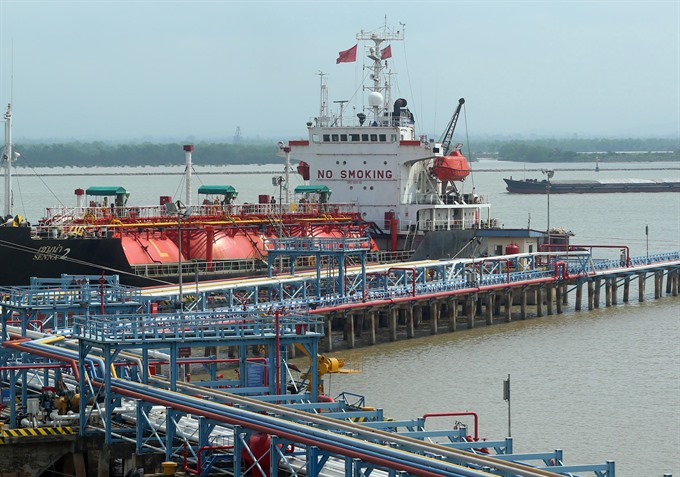 Economy
Economy

The Finance Ministry (MoF)’s proposal to almost triple the environmental protection tax on oil and gas consumption would reduce businesses’ competitiveness against foreign firms, according to the Việt Nam Chamber of Commerce and Industry (VCCI).
 |
| The Việt Nam National Oil and Gas Group (PVN) loads petrol and oil at Đình Vũ Port in northern Hải Phòng City. — VNA/VNS Photo Huy Hùng |
HÀ NỘI — The Finance Ministry (MoF)’s proposal to almost triple the environmental protection tax on oil and gas consumption would reduce businesses’ competitiveness against foreign firms, according to the Việt Nam Chamber of Commerce and Industry (VCCI).
VCCI sent their comments on draft amendments and supplements to the environmental protection law to the ministry expressing concerns on the proposed tax hike.
The ministry proposed an environment tax of VNĐ4,000-8,000 per litre of gasoline (compared to the current VNĐ1,000-4,000), VNĐ3,000-6,000 per litre of aviation fuel, VNĐ1,500-4,000 per litre of diesel oil, VNĐ300-2,000 per litre of kerosene, and VNĐ900-4,000 per kilogramme of mazut.
VCCI said environmental protection taxes were not related to socio-economic development policies and should not be adjusted based on the policies.
Đậu Anh Tuấn, head of VCCI’s Legal Division said petroleum was an essential good. If the ministry’s proposal aimed to limit the environmental effects by reducing petroleum consumption, it would not be very effective.
VCCI pointed out that the proposed environment tax hike would hurt enterprises and the economy. It said fuels are an important input for the transport, agriculture and seafood sectors.
Statistics from the ministry’s Price Management Agency showed that fuels make up 25-45 per cent of costs of vehicles and 39.5 per cent of costs of airlines. Fuels account for 33-59 per cent of production cost in the seafood sector and transport makes up 35-40 per cent of farming costs.
It also said the tax hike, which aimed to increase collection to the State budget, would have a negative impact on the economy as a whole. The tax cut under commitments of trade agreements would benefit both local and foreign firms.
If the tax hike proposal was approved, Vietnamese companies would lose their competitiveness.
VCCI called for a comprehensive and objective assessment of the impact of an environment tax increase for fuels on the economy and social welfare.
The ministry reported environment tax revenue accounted for 4.1 per cent of total budget collections last year and 99 per cent of it came from fuels. VCCI calculated the percentage would rise to 9.8 per cent if import, special consumption and value-added taxes were included.
The Ministry of Justice also asked the MoF to carefully consider the environmental protection increase as it would directly affect businesses and benefits for people.
It said the draft was not adequate and lacked assessments, with the proposed increase nearly triple compared to the current level.
The Ministry of Foreign Affairs also suggested the MoF should consider whether the proposal was necessary, especially as local firms have faced difficulties and petroleum is already subject to a number of taxes and fees.
The ministry also proposed supplementary assessments on socio-economic effects after the tax hike in the draft.
Earlier, MoF said the tax hike aimed to improve awareness on environmental protection, contributing to limiting consumption of goods causing environmental pollution.
It also aims to offset decreasing collections from import-export tax.
The proposal was also believed to prevent smuggling of petroleum trading as Việt Nam’s petroleum prices have been lower than other countries in the region. — VNS




